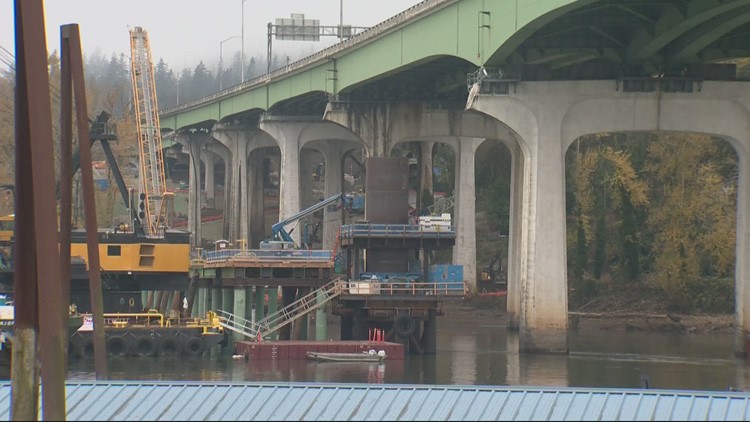OREGON CITY, Ore. — Most Portland metro area residents are concerned about roadway conditions and congestion in the region, but they're not enthusiastic about using freeway tolls to tackle the problem, according to the results of a poll sponsored by several cities along the Interstate 205 corridor in Clackamas and Washington Counties.
The Oregon Department of Transportation is working on two major tolling projects, the first of which will add tolls on I-205 at the Abernethy Bridge to help fund a project to widen and seismically strengthen the crossing. The Regional Mobility Pricing plan, scheduled to begin a couple years later, will add tolls along most of Interstate 5 and I-205 throughout the metro area. Both projects are intended to raise revenue and reduce traffic backups through congestion pricing.
The poll was conducted by Portland-based DHM Research, which surveyed 600 voters from Clackamas, Washington and Multnomah Counties from February 7 through 13. Surveys were conducted by phone or online using a link texted to participants. The poll has a margin of error of plus or minus 4%.
The survey was sponsored by West Linn, Oregon City, Tualatin, Wilsonville and the United Food & Commercial Workers Union Local 555. Leaders of some of the sponsor cities have previously voiced concerns or opposition about the tolling plan.
Across the region, 74% of survey respondents said they were very concerned or somewhat concerned about road quality and 81% said they were very or somewhat concerned about congestion, but 76% said they were somewhat or strongly opposed to the use of tolls in the Portland area. On the other side, 19% percent said they were somewhat or strongly in favor of tolls, and 5% said they didn't know.
When asked about the two specific projects, 64% said they somewhat or strongly oppose the Abernethy Bridge tolling plan and 32% said they somewhat or strongly support it, while 71% said they somewhat or strongly oppose the broader Regional Mobility Pricing plan and 27% said they somewhat or strongly support it.
Opposition was highest in Clackamas County and lowest in Multnomah County, both for tolling in general and for each of the two individual projects, but a majority of respondents were opposed in every county on all three questions.
When asked to consider their regular traveling patterns, 82% of respondents said they probably or definitely did not think public transit would be a viable alternative to traveling along the tolled roads.
When the supporters were asked why they supported tolling, the most common answers were that it will help raise revenue and supplement the gas tax, help fund road maintenance and expansion or that it would reduce congestion and traffic.
When opponents were about their opposition, the most common explanation was that people already pay taxes for roads or that taxes are already too high. The second-most common answer was that tolls would be expensive and unfair to low-income drivers.
Only 61% of respondents said they had heard or read anything about ODOT's tolling proposals for Portland, and most hadn't engaged in discussion; 23% said they'd visited ODOT's webpage about tolls, 13% said they'd provided feedback and 6% said they'd attended at least one public meeting about it.
The respondents were also asked about their support for four alternative methods of raising revenue: increasing registration fees for electric vehicles, increasing registration fees for all vehicles, increasing the gas tax and switching to a pay-per-mile system instead of taxing drivers at the pump. 61% said they somewhat or strongly supported hiking electric vehicle fees, but a majority of respondents were opposed to each of the other three ideas.



